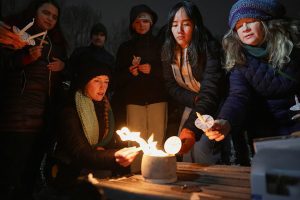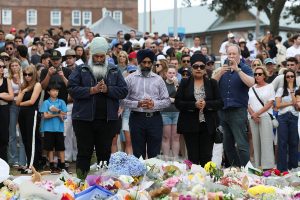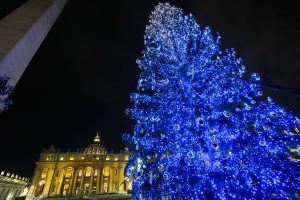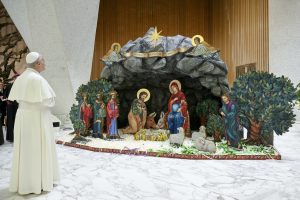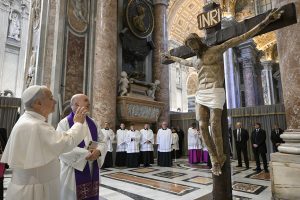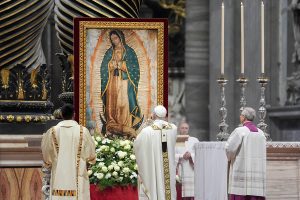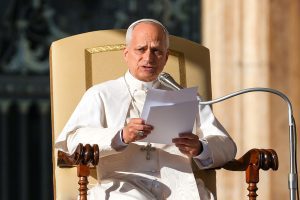VATICAN CITY (OSV News) – In one of the most anticipated U.S. episcopal appointments of his pontificate so far, Pope Leo XIV has accepted the resignation of Cardinal Timothy M. Dolan of New York and named as his successor Bishop Ronald A. Hicks of Joliet, Illinois.
The resignation and appointment were announced by the Vatican on Dec. 18.
Cardinal Dolan was named archbishop of New York by Pope Benedict XVI on Feb. 23, 2009, and three years later Pope Benedict elevated him to the College of Cardinals.
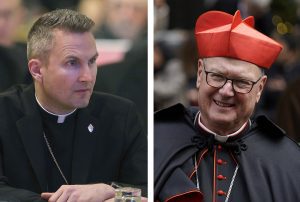
On Feb. 6, he turned 75, the age at which canon law requires bishops to submit their resignation to the pope.
Cardinal Dolan previously served as president of the U.S. Conference of Catholic Bishops and has held several national leadership roles, including chair of the USCCB’s pro-life and religious liberty committees. He served as chairman of Catholic Relief Services, and currently serves as a member of the Dicastery for the Oriental Churches and the Dicastery for Evangelization.
Since Sept. 29, 2020, Archbishop Hicks, 58, has led the Diocese of Joliet, which includes Chicago’s western and southern suburbs, stretching into near-central Illinois. He will be heading the second largest archdiocese in the United States, which has 2.5 million Catholics, five times the 520,000 in Joliet.
The new archbishop will be managing a large-scale clergy abuse settlement among other work once he takes over his new assignment. Cardinal Dolan said in a Dec. 9 letter to his flock the archdiocese would be entering into mediation with 1,300 claimants over allegations of clergy sexual abuse. He said the archdiocese would need to raise $300 million toward settlements.
According to the Illinois Attorney General’s 2023 report on clergy sexual abuse in Illinois’ dioceses, Joliet had reported 100 credible cases of abuse that took place from 1949 to 2004. It has paid more than $7 million in settlements in three instances, the most recent in 2019, a year before now-Archbishop Hicks was installed.
According to Deacon Dominic Cerrato, the new archbishop of New York is up to the task of leading a significantly larger (arch)diocese because “all of his skills” as bishop are “transferable and scalable.”
In particular, Deacon Cerrato, who recently retired as director of the diaconate at the Diocese of Joliet, said Archbishop Hicks is a “very prayerful man” whose spirituality guides his leadership.
“A humble man, in the sense that he always asks for prayers. He would be praying for whatever audience and say, ‘Please pray for (him),'” Deacon Cerrato told OSV News. “Without a doubt, he was clearly seeking God’s will as he shepherded the diocese. We would certainly always begin with prayer, but (his) demeanor bespeaks a man of deep spirituality.”
The diocese went through a restructuring in 2023, where 16 parishes were slated for mergers and closures. Officials cited aging buildings, fewer priests and diminishing Mass attendance but made no mention of abuse settlements for the consolidation.
In a 20-page pastoral letter about discipleship to the faithful in the Diocese of Joliet titled “Make!,” now-Archbishop Hicks laid out plans to carry out the vision he brought when he was first installed five years ago, of “putting catechesis, evangelization and faith into action.”
With a heartfelt admission that “vulnerably reflects (his) heart” in his diocesan website blog dated Sept. 30 about the letter the bishop wrote, “I love Jesus and I want you to love Him too.”
“The letter offers a clear path: conversion, confession, communion, commission, all held together by prayer. These are not abstract concepts but real, concrete steps that anyone can begin today,” he said. A website is dedicated to the plan with sections on these five areas on the path to making disciples of the faithful.
Deacon Cerrato described the bishop’s leadership style as one that “builds communion, strengthens mission, and reflects the gentle authority.”
He recalled Archbishop Hicks asking him what he thought the diocese should do during a meeting on one occasion.
“And I’m like, shocked because what I discovered is that he was very open to solutions if there was a challenge brought before him. He was open to listening to what might happen. So his governance wasn’t just high level, but he dipped down into the people. You could say, like, Christ he stooped low into the people to listen,” said Deacon Cerrato.
He said the newly named archbishop also spent a lot of time with the faithful at various events.
Deacon Cerrato said, “When you saw him, the smile, the availability. I mean, the guy would stand for pictures for hours with people. He just wouldn’t go to an event and then just leave. So in that respect, there was a sense of shepherding. There was a sense of caring. There was a sense of listening. That having been said, he certainly was a decisive leader in the sense that, if a decision had to be made, he would make the decision.”
Earlier, he was appointed vicar general of the Archdiocese of Chicago by Cardinal Blase J. Cupich in 2015, and in September 2018, he was ordained an auxiliary bishop of the archdiocese at Holy Name Cathedral in Chicago.
Archbishop Hicks was ordained to the priesthood for the Archdiocese of Chicago on May 21, 1994. He served as an associate pastor at Our Lady of Mercy Parish in Chicago from 1994 to 1996 and at St. Elizabeth Seton Parish in Orland Hills, Illinois, from 1996 to 1999. From 1999 to 2005, he lived and ministered at St. Joseph College Seminary in Chicago as the dean of formation.
In July 2005, with permission from Cardinal Francis E. George, then archbishop of Chicago, Archbishop Hicks moved from Chicago to El Salvador to begin a five-year term as regional director of Nuestros Pequeños Hermanos, or NPH, in Central America. NPH is a home dedicated to caring for more than 3,400 orphaned and abandoned children in nine Latin American and Caribbean countries.
From 2010 to 2014, Archbishop Hicks served as the dean of formation at Mundelein Seminary.
Like Pope Leo, he was born in Chicago. He graduated from Quigley Preparatory Seminary South in 1985. He received his bachelor of arts degree in philosophy from Niles College of Loyola University, Chicago, in 1989, and both his master of divinity degree in 1994 and his doctor of ministry degree in 2003 from the University of St. Mary of the Lake in Mundelein, Illinois.
Archbishop Hicks serves on the USCCB’s Committee on Clergy, Consecrated Life and Vocations and as the conference’s liaison to the Association of Ongoing Formation of Priests and the National Association of Diaconate Directors. He has also been appointed to the USCCB’s Charter Review Workgroup. He also serves on the board of the Catholic Extension Society and the Mundelein Seminary Advisory Board.

